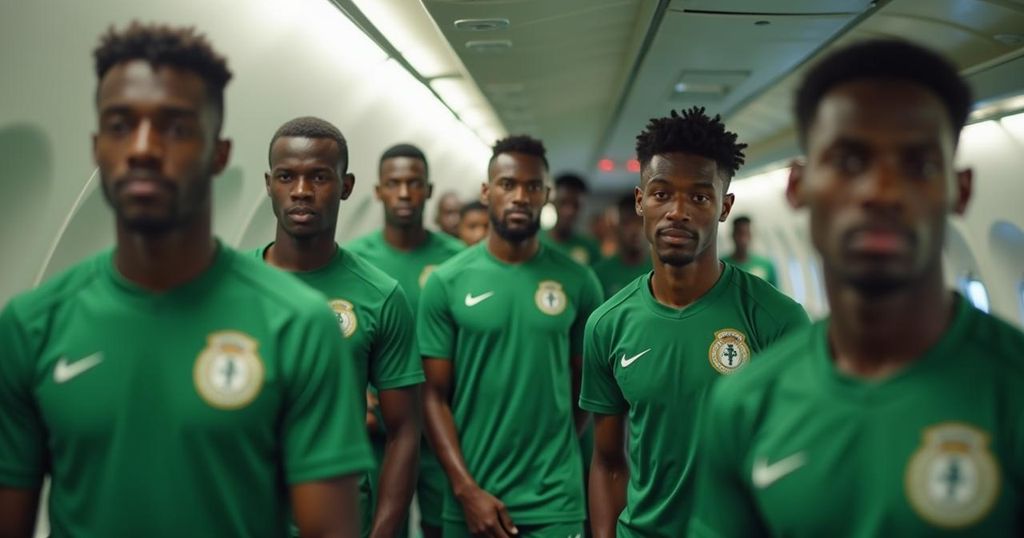Nigeria Team Forfeits Match in Libya Due to Inhumane Treatment

The Nigerian football team has chosen to forfeit their Africa Cup of Nations qualifier against Libya after being held for over 15 hours under distressing conditions at an abandoned airport. Led by Captain William Troost-Ekong, the team prioritized their safety, prompting the Nigeria Football Federation to arrange their return home. Former player Victor Ikpeba has criticized Libya, advocating for sanctions and questioning the legitimacy of their hosting status.
The Nigeria Football Federation announced plans to repatriate the national football team following a series of alleged inhumane conditions experienced while in Libya, where they were detained at an abandoned airport for over 15 hours. Led by Captain William Troost-Ekong, the Nigerian squad has resolved to forfeit their scheduled Africa Cup of Nations qualifier against Libya, citing serious safety concerns that precluded their participation. Victor Ikpeba, a former African footballer of the year, has voiced his support for the team’s decision and is calling for significant sanctions against Libya, expressing dismay regarding the circumstances and questioning how Libya was permitted to host international matches. The Nigeria Football Federation (NFF) confirmed the team’s imminent return, with communication director Ademola Olajire stating, “Players have resolved not to play the match any longer as NFF officials are making plans to fly the team back home.” Nigeria has also filed a formal complaint with the Confederation of African Football (CAF) regarding the distressing situation. Despite their chartered flight arriving on Sunday, the team faced an extended ordeal at the airport, further complicated by restrictions on the Nigerian embassy’s ability to intervene without permission from Libyan authorities. Captain Troost-Ekong declared on social media, “We will not accept to travel anywhere by road here even with security it’s not safe. We can only imagine what the hotel or food would be like given to us if we continued.” Ikpeba voiced his frustrations through AFP, asserting, “If CAF know their job, Libya ought to be banned from international football. This is a high-risk country, and one really wonders who approved for Libya to be playing their games at home.” He further remarked, “The team will call off their bluff and not play this match.” Previously, Nigeria had secured a 1-0 victory over Libya in Uyo, positioning themselves at the top of Group D, while Libya remains at the bottom of the table. The situation exemplifies the dire circumstances that can arise when national teams are subjected to inadequate conditions while representing their countries abroad. The Nigerian team’s decision not to participate in the qualifier reflects a growing emphasis on player safety and welfare in international sports. In conclusion, the Nigerian football team’s experience in Libya highlights pressing issues surrounding player safety and the responsibilities of governing bodies in ensuring conducive environments for international matches. While Nigeria seeks to address the grievances through formal channels, the incident raises broader questions about the approval processes for host countries in the context of international competitions.
The current predicament faced by the Nigerian football team stems from their qualification match against Libya for the Africa Cup of Nations 2025. The circumstances they encountered—being held for an extended period in unsuitable conditions—underscore the potential dangers that athletes may face while traveling abroad for competitions. Such situations necessitate careful evaluation and monitoring by football governance entities to ensure that host countries can provide safe environments for visiting teams. Former players and officials are increasingly vocal about player welfare in light of such incidents, prompting calls for greater accountability within football’s regulatory frameworks.
The Nigerian national football team’s refusal to play their scheduled qualifying match against Libya due to alleged inhumane treatment reveals critical concerns over athlete safety and the protocols governing international football events. This incident may drive calls for enhanced oversight by organizations such as CAF to prevent similar occurrences in the future, ensuring that host nations are adequately equipped to accommodate visiting teams in a safe and professional manner.
Original Source: www.news24.com








